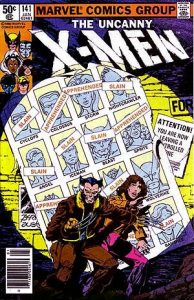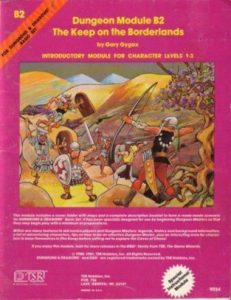Our most popular posts on Nerds on Earth are our nostalgia ones. When I share my favorite arcade cabinets, reflect on Claremont X-Men, or write-up my favorite old school D&D modules, those posts get likes and shares far beyond anything else we do.
Nostalgia works on us nerds like labs rats. When Nerds on Earth presses that nostalgia lever, folks line up for their peanut.
 Interestingly, our second most popular posts are when folks suspect we dislike something. People are drawn to negative headlines like Mothra to a flame. Evidently, if folks can’t soak in nostalgia, they’d rather spend their time stewing and fuming with disappointment at the present they inhabit.
Interestingly, our second most popular posts are when folks suspect we dislike something. People are drawn to negative headlines like Mothra to a flame. Evidently, if folks can’t soak in nostalgia, they’d rather spend their time stewing and fuming with disappointment at the present they inhabit.
This is entirely unsurprising. The word nostalgia comes from two Greek words; nostos, meaning “to return home,” and algos, meaning “pain.” So nostalgia means to return home to our pain?
Well, not so fast. Some memories such as the nerdy things we played with as a kid are often purely happy ones. But even when we are asked to remember mostly happy memories, we necessarily trim away anything that could be painful. It’s like 1d8 damage to our psyche otherwise.
So with the painful parts of the memories trimmed away, nostalgia allows us to return home to what we perceive as a simpler time. It’s equal part genuine affection and equal part subconscious coping mechanism.
There is an interesting story in the Hebrew Bible. 1 Chronicles 11:17 reads, “[King] David said longingly, ‘O that someone would give me water to drink from the well of Bethlehem…'” The surrounding context of that passage was that David had grown up in Bethlehem but the present reality for David was pretty crummy and his future looked uncertain. So in that uncertain, painful moment his greatest desire was a simple touchstone from his childhood.
 That passage in scripture of him defaulting back to what he felt were simpler times is pure nostalgia on David’s part. And sorry for taking you to Sunday school, but I share that for two reasons. First, no one ever reads Chronicles, unless they think it is The Chronicles of Narnia. So I wanted to see if I could work that in there. But mainly I share it to illustrate that nostalgia is something that has been a part of the human condition across all people, across all times.
That passage in scripture of him defaulting back to what he felt were simpler times is pure nostalgia on David’s part. And sorry for taking you to Sunday school, but I share that for two reasons. First, no one ever reads Chronicles, unless they think it is The Chronicles of Narnia. So I wanted to see if I could work that in there. But mainly I share it to illustrate that nostalgia is something that has been a part of the human condition across all people, across all times.
Nerdy brands understand this about nostalgia and pull our heartstrings in order to leverage our memories for profit. By tapping into our emotions, nostalgia encourages us to buy a product from a moment in time when things seemed simpler and we thought we were happier.
Never content with our present, we keep dipping into the well of our past, escaping into those familiar memories. Really, it’s not so much that humanity has run out of fresh ideas, it’s just that the old ones are safe money makers.
 When I think about my first memories, so many of them revolve around my nerdy interests, toys, and activities. D&D, Star Wars action figures, and comic books continue to shape my memories. Now think about your first memory. I’m sure it’s similarly mundane. But it’s also pretty momentous, considering that it continues to inhabit your thoughts, even after what could be decades later.
When I think about my first memories, so many of them revolve around my nerdy interests, toys, and activities. D&D, Star Wars action figures, and comic books continue to shape my memories. Now think about your first memory. I’m sure it’s similarly mundane. But it’s also pretty momentous, considering that it continues to inhabit your thoughts, even after what could be decades later.
It’s these memories that make nostalgia a powerful yet occasionally problematic emotion. When nostalgia is weaponized to the point where our history is sold back to us in an idealized form, we end up in a kind of sham present, where the hard lessons of the past are pushed aside in favor of a romanticized vision of it.
I hate to bring this up when we’re supposed to be feeling good, but the most relevant example is our current cultural nostalgia for “simpler times” in America. This nostalgia has lead to the kind of white nationalism that we’ve seen in our current political climate. It’s a toxic form of nostalgia that purposefully ignores and marginalizes the strides towards equality that have been made by every other race and gender over the past sixty years.
As bad as the present may seem, the people who actually lived in those “simpler times” had less education, less health care, less equality, and less ability for economic and social advancement than today. To use a personal example, while I have deep nostalgia for the D&D books I once read as an 80s kid, my mind trims off the fact that the broader reality was a shy, awkward kid living in West Virginia poverty, being ostracized and marginalized for enjoying a game that many didn’t understand at the time.
Nostalgia for a time and place that we can never actually get back to does something subtle to our present—it acts as a big drain on our being emotionally available for those actually around us. Rather than live in the actual emotions and environment of the present–be it joy or pain–nostalgia can trap us in a way. It can be a dopamine drip of longing for a time that can never again be, and never fully was.
 But, look, there’s nothing wrong with remembering. Quite the opposite: Individual memories of family, friends, and special moments are what make us the person we are! But longing to return to the past—or really, longing for an idealized version of the past that never existed—takes us away from confronting the challenges or seizing the opportunities of the present. Going back is not an actual option, despite what Doc Brown promises.
But, look, there’s nothing wrong with remembering. Quite the opposite: Individual memories of family, friends, and special moments are what make us the person we are! But longing to return to the past—or really, longing for an idealized version of the past that never existed—takes us away from confronting the challenges or seizing the opportunities of the present. Going back is not an actual option, despite what Doc Brown promises.
Lingering too long in nostalgia sucks the oxygen out of the room for new connections, new ideas, and new experiences. So what to do in the face of the nostalgia trap? Well, knowing is half the battle, so the first thing is to realize it exists, which hopefully you do by now. The second thing is to figure out if and where you are caught in it, which, let’s be honest, many of us seem to be, at least at some times, and to some degree.
Weirdly, the way out is to remember. Remember it all, the good and the bad. Study history, so as not to misunderstand or idealize it. Remember how good it feels to learn something new. Remember how good it feels to make a new memory.
So, let’s spare a thought for our old Star Wars toys, but may we ever turn our gazes forward in order to create a present and a future that one day we can remember, without sanitization, as truly better than what came before it. As Luke Cage says, “Forward, always. Always forward.”

